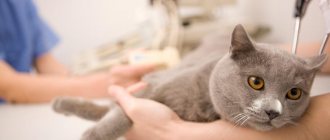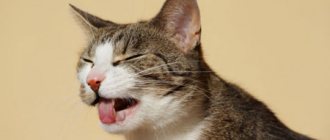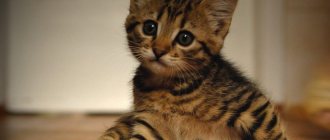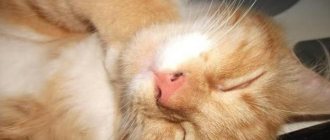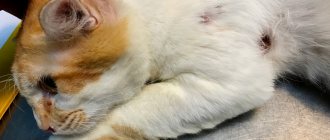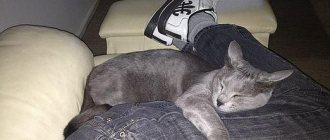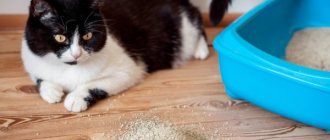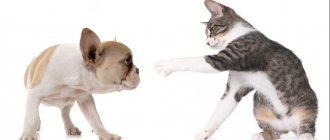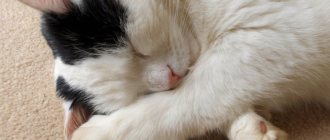Overly caring pet owners often sound the alarm due to any changes in the behavior of their pets. In most cases, their fears are meaningless. But there are times when unusual symptoms should be treated with suspicion. So, a sign of serious health problems in cats may be breathing through the mouth. Let's try to figure out in which cases this deviation is dangerous, and in which it is not worth attention.
When you don't need to worry
- Heat. When it's too hot outside or at home, cats may experience shortness of breath. Not only people, but also animals suffer from too high temperatures. Pets also want fresh air and coolness. Despite the fact that cats love warmth, they do not tolerate excessive heat well.
- Active games. Cats, especially at a young age, love to play a lot or just run around the apartment. They need to expend energy. After such cat training, the cat needs to bring its breathing back to normal. Wait a little and the animal will begin to breathe steadily again.
- Childbirth. Rapid breathing through the mouth during childbirth is normal. At this crucial moment, the cat simply needs more oxygen than usual.
- Fright. Strange breathing may be caused by fear or stress. Let your pet calm down.
- Forgetfulness. Maybe you've noticed: sometimes cats go into their inner cat world and forget to close their mouths and hide their tongues. It looks funny, but the owner may get scared.
- Relaxation while sleeping. Some animals sleep with their mouths open. This is rather a good sign. This means the cat sleeps very soundly and sweetly.
- Thirst. Maybe you just forgot to pour water for your pet? Thirst can cause heavy breathing, especially in hot weather.
If unstable breathing is bothering your animal for any of these reasons, then there is no need to worry. Soon the cat will return to normal and begin to breathe calmly and evenly, as before. Your participation in troubleshooting the problem will only be needed in case of overheating. It will be necessary to help the animal cool down its body.
Main causes of shortness of breath
A healthy cat never breathes with its mouth open, no matter how long it runs and plays. Shortness of breath always has deep reasons that the owner may not be aware of. During an examination, any veterinarian will tell you about the following options:
- Stuffy nose. We wrote in detail about the possible causes of congestion in the article “If a cat has a stuffy nose and he sneezes.”
- Poisoning by toxins or drugs. In general, any severe intoxication of the body, including serious infections, is accompanied by shortness of breath: this is how the body tries to get more oxygen.
- Trauma, especially if the injury involves the chest or diaphragm, causing partial collapse of the lungs and pulmonary hemorrhage.
- A foreign body in the respiratory tract that interferes with normal breathing.
- Smoke inhalation.
- Bronchial asthma is a chronic disease of cats that occurs due to a specific immunological reaction of the body. During asthma attacks, the bronchi become so narrow that it becomes very difficult to breathe.
- Lung diseases. This includes severe bronchitis, pneumonia, and pleurisy.
- Heart failure caused by both congenital defects and acquired diseases.
- Thromboembolism is a blood clot that occurs for various reasons and blocks a large vessel.
- Neoplasms in the lungs, respiratory tract or abdominal cavity. Sometimes a tumor grows in the abdomen so large that it begins to put pressure on the lungs, making it difficult to take a full breath.
- Accumulation of fluid in the chest and abdominal cavity due to various inflammatory processes of internal organs.
- Anemia, including blood loss and internal bleeding.
- Head injuries and brain damage.
- Overheating and heatstroke.
- Systemic and hormonal disorders, for example, hyperthyroidism - excessive production of thyroid hormones.
As you can see, there are a great many conditions accompanied by shortness of breath. Such a wide variety usually confuses owners, especially since many diseases are hidden, manifested only by difficulty breathing
This is why it is so important to take your cat to a veterinarian if shortness of breath occurs.
When to sound the alarm
When the above reasons for unstable breathing are absent, and the cat feels unwell, you need to pay attention to other symptoms. The presence of these deviations indicates that it is time to contact a veterinarian:
- Cough;
- Heat;
- Wheezing;
- Convulsions;
- Lack of appetite;
- Loss of appetite;
- Vomit;
- Tachycardia;
- Redness of mucous membranes;
- Nervousness or apathy.
We also recommend reading:
Pet habits: what signals should you pay attention to? Top 7 Dogs That Are Great for Children Stubborn Personality: Dogs That Are Difficult to Train Ways to Correct Malocclusion in Puppies
The main physiological reasons for breathing through the mouth
Frequent breathing in an animal can occur due to pathological and physiological reasons. If we are talking about hot weather or the postpartum period, the cat’s condition is quite justified: its body is experiencing a stressful situation. Over time, breathing will stabilize, so you just need to wait a while and help your pet as much as possible.
Cat with ascites
Pathological
Rapid breathing in a cat may indicate the presence of a pathology. It is worth paying attention to other symptoms in order to say with confidence what kind of disease the animal has. It is recommended that you contact your veterinarian first if your kitten begins to breathe rapidly.
The following are related to rapid breathing:
- blood diseases;
- pathologies of the heart, lungs;
- an increase in the size of internal organs due to the presence of certain pathologies;
- ascites;
- increase in abdominal pressure.
For your information! Lung disease can be considered the entry of a foreign organ into the respiratory tract, trachea or bronchi. But often a cat’s breathing becomes faster due to narrowing of the airways due to spasm or the presence of tumors. There may also be problems with the expansion of the lungs.
If breathing problems occur that are accompanied by additional symptoms, it is necessary to keep the cat under constant observation so that its condition can be assessed. You should not make a diagnosis and start treatment yourself, as this can harm your pet.
Physiological
Heavy breathing may occur in a mother cat who has just lambed. The animal’s body is experiencing stress at this moment, since childbirth is a difficult process. Do not be alarmed by the cat's shortness of breath at this moment, since breathing should soon stabilize.
Your pet may breathe quickly and stick out its tongue due to overheating. They don't have as many sweat glands as humans do, so they have to open their mouths to cool off. Also, rapid breathing in an active cat appears after physical activity. In this case, dilated pupils can also be observed.
Blue mucous membranes in a cat
If a cat is breathing frequently after surgery (even if it was castration or sterilization), then you should not panic right away: the animal is going through the process of recovery from medications. If gradually the depth and frequency of breathing begin to return to normal, then you should completely postpone the alarm.
However, there are cases when this process gets worse. It is necessary to check the animal's gums, lips and nose. If they acquire a bluish tint, you should immediately contact a veterinarian, since such symptoms are a complication of the respiratory or cardiovascular systems.
When worried, cats also begin to breathe heavily. It is necessary to look at how the animal looks: it flattens its ears and looks frightened, it hides or attacks in a stressful situation; a sick animal does not behave this way.
Note! Animals can dream too, so if your pet begins to breathe rapidly during this dream, there is no need to worry. Not everyone can sleep without dreams, but everyone will react to what happens in their dreams.
Cats, unlike dogs, should not breathe through an open mouth. During normal breathing, air flows only through the nasal passages. If the pet begins to open its mouth to inhale and exhale, then we can conclude that there is hypoxia - a lack of oxygen in the body. Hypoxia comes in varying degrees.
In normal condition, a cat's lungs should be surrounded on all sides by a vacuum, thanks to which the organ can expand and contract. As a result of various reasons, this cavity loses its functionality and liquid can enter it. Against this background, there is a sharp lack of air. The animal begins to inhale deeply to compensate for the lack of the element in the blood.
Among the main diseases that cause malfunction of the pulmonary system are the following factors:
- Increased indoor air temperature. Shortness of breath and opening the cat's mouth can be replaced in the summer, when the heat is sweltering. A similar phenomenon is observed in apartments during the heating season. In this case, breeds with long hair are most often affected. In this case, there is no need to panic. After temperatures stabilize, the condition of the four-legged animal will be restored. To alleviate the condition, it is recommended to give the cat to drink more often;
- Increased physical activity. Often, a cat breathes with its mouth open, and there is obvious shortness of breath after active running or playing. Don't panic; during physical activity, all organs and systems need more oxygen. To provide the body with the necessary element, the pet begins to breathe through the mouth;
- Stressful situation. Cats are quite timid creatures. Fear can cause a characteristic symptom, shortness of breath. It often happens when an animal is attacked by dogs or more aggressive cats. In case of severe stress, it is recommended to calm the patient down with gentle speech and give him sedatives.
We invite you to familiarize yourself with: Types of wild cat breeds: list of felines, description
There are also pathological reasons that require doctor's intervention.
The cat opens its mouth and breathes like a dog, reasons:
- If you notice that your cat's rapid breathing with an open mouth and protruding tongue is in no way associated with stress or increased ambient temperature, observe how long this happens.
- It is necessary to pay attention to the accompanying symptoms. These may include vomiting, nausea, loss of coordination, and wheezing. In most cases, cats inhale this way when foreign bodies enter the respiratory tract.
- It could be wool or food debris. This often happens if a pet eats very quickly and tries to get enough quickly.
Pet
Cases when only a specialist can handle it
Mouth breathing can be a symptom of a dangerous disease. Let's look at the most common causes of the disease:
- Allergy. It can be caused by anything: food, toilet litter, shampoo, an insect bite. To identify allergies, you need to consult a veterinarian. Try to compare all the facts: what could your pet’s body react to like that? What new things did you buy for the cat? Has he been outdoors lately? Also pay attention to rashes, itching and sneezing. These are all clear symptoms of allergies. This data will help the veterinarian identify the allergen.
- Injuries. They can cause the animal very severe pain. Because of this, breathing may become faster. If your pet has been injured or hit, pay attention to his breathing. If it is not stable, it means the animal is in pain. In this case, the cat needs to be shown to the veterinarian again. Your pet may need re-examination and may have injuries that are not obvious.
- Pulmonary pathologies.
- Pathologies of the nose. These include airway spasms and nasal blockage.
- Foreign objects in the throat. You will immediately recognize this reason. The cat will characteristically clear its throat, wheeze and try to reach the object.
- Endocrine diseases.
- Fever and temperature.
- Accumulation of air in the sternum.
- Heart failure.
All these problems can only be identified and treated by a specialist. Do not self-medicate. But you can still provide first aid to your pet.
Heavy breathing as a sign of illness
Changes in breathing in and of themselves are not considered a disease. This is rather a sign of some serious illness. So, difficulty breathing can develop in a pet for the following reasons:
- Foreign object in the respiratory tract
- very often, when a cat begins to breathe heavily, the culprit is a pebble, twig or bone that is stuck in the respiratory organs. If something gets into the nasal passages, the cat will begin to sneeze heavily, clear snot will flow from its nose, its eyes will begin to water, and breathing problems may occur. When a foreign object gets into the throat, the cat, in addition to heavy breathing, experiences very strong hypersalivation, the unfortunate animal can gag, has difficulty swallowing, and breathes with its mouth open; - Infectious and non-infectious diseases of the respiratory system
- with rhinotracheitis, calcivirosis, pneumonia, bronchitis, laryngitis, rhinitis, tracheitis, asthma and other ailments of the respiratory system, cats breathe heavily with whistling or wheezing, body temperature rises, animals often catch air with their open mouths, sneeze. In case of infectious diseases, a cat may have yellow-green discharge from the nose and eyes, diarrhea and vomiting may develop, and ulcers may appear on the tongue. Almost always, respiratory diseases negatively affect the animal’s appetite and interest in games; - Pulmonary edema
is a similar ailment in which a cat’s breathing becomes heavy, and can be caused by many reasons: liver and kidney disease, allergies and anaphylactic shock, trauma, heart disease. With pulmonary edema, a cat may lie indifferently, breathing heavily with its stomach and gasping for air with its open mouth, and if you lean your ear to its chest, you can easily hear noises and gurgling. The purr does not eat, does not respond to the owner’s call, the animal’s mucous membranes become very pale or even bluish; - Lungworms
- if a cat lies and breathes heavily most of the time, refuses food, has a dry cough and severe shortness of breath even with minimal exertion, the culprit may be parasitic worms that have taken a liking to the lungs; - Heart failure
- with heart problems, the animal develops severe shortness of breath, the cat breathes heavily with its stomach, coughs, its mucous surfaces turn pale to a slight blue color. In some situations, foam begins to come out of the nose and mouth; - Poisoning
- if a purr accidentally swallows, for example, an alkali or an acid, she will probably have breathing problems, hypersalivation, convulsions, diarrhea and vomiting, pulse irregularities, trembling; - Oncology
– sometimes animals have cancer (both primary pathology and metastases) of the respiratory system (for example, the larynx or lungs, etc.). With neoplasms, the cat breathes heavily and opens its mouth slightly, often coughs (dry or with purulent-bloody sputum), wheezes, and swallows saliva often and with difficulty. The animal's voice may become distorted as the tumor develops. In addition, the purr eats little, loses weight, and sometimes develops a fever; - Anemia
- pallor of the mucous membranes, rapid or decreased pulse, heavy breathing, apathy and refusal to eat can symbolize that there are not enough red blood cells and hemoglobin in the blood; - Injuries to the spine, ribs, pectoral muscles, lungs
- with such problems, cats try not to use the chest when breathing, breathing from the stomach. Shortness of breath and pain are pronounced. Hematomas and even open wounds and abrasions can be found on the skin. The cat's pulse may become rapid and subsequently cause pain; - Hypoxia
– with oxygen deficiency, which can develop, for example, against the background of heart disease or severe fatigue, cats begin to breathe heavily, they may suffer from nausea (even vomiting), and motor coordination is impaired; - Obesity
– very often overweight cats breathe heavily even after minimal exercise. The symptoms of obesity, as they say, are obvious: the animal’s body weight is higher than normal, and the figure is more like a ball with legs.
First aid
- If you see that the animal is unwell, conduct an examination of the upper respiratory tract. The animal may have something stuck in its nose or mouth.
- Remove mucus from your cat's nose.
- Try inhaling air into the nose or mouth of the animal through your palm rolled into a tube.
- Open the window and ventilate the room.
- If overheating, pour water into the animal and apply a wet cold towel to the cat's forehead and nose.
When you notice alarming symptoms, don’t waste a minute. The health of your animal is in your hands. Don't ignore your pet's rapid breathing. It may be a symptom of a serious illness.
Reasons for changes in respiratory rate in cats
Physical activity. In healthy animals, respiratory rate depends mainly on the level of physical activity. The calmest breathing in cats is during sleep;
READ Why does a cat shed a lot and what to do if the hair comes out and falls out in large quantities in a kitten and an adult animal
Stress. When nervous, angry, or excited, the cat's breathing quickens. For example, while traveling in a car, when moving to a new place, during various medical procedures. This is a short-term phenomenon and goes away as soon as the source of stress disappears. In pregnant, giving birth, lactating and estrus cats, breathing also often noticeably increases, but this is not a cause for concern, since this is a normal reaction of the body to additional stress;
Overheating or hypothermia. When overheated, a cat breathes through its mouth, often and heavily. He tries to lie flat with his whole body on the coolest surface in the house - tiles, linoleum or under the bathtub. If the temperature in the room is too high, wet a towel with cold water and wrap it around your pet, or simply wet his ears and underbelly, and make sure he drinks enough.
Injuries to the chest, spine and ribs. If your cat sticks out his tongue and breathes frequently, taking small, shallow breaths, then breathing may be causing him pain. He may try to hide away from everyone, walk carefully, as if his movements are constrained, and eat poorly. In this case, the animal must be carefully examined. If there are wounds, torn hair, or some areas of the body are extremely painful when touched, take him to the vet immediately;
Foreign body in the throat or nose. Look into the cat's throat. If you notice an object stuck in your larynx and making it difficult to breathe, try to remove it. If it doesn’t work the first time, go to the clinic immediately, otherwise repeated attempts can only push it deeper. If the cat wheezes when breathing through the nose, or a whistle is heard, then it seems that a foreign body is stuck in the nasal passage;
Deterioration of health due to the development of various diseases and pathologies. In such cases, a change in breathing rate is accompanied by other alarming symptoms - an increase or decrease in the cat’s body temperature, signs of dehydration, vomiting, coughing, discharge from the eyes and nose. Wheezing in the chest is a symptom of stagnation of fluid or mucus, which occurs with pneumonia or heart disease. When a cat breathes with his tongue hanging out, it is possible that the nasopharyngeal mucosa is so inflamed that breathing through the nose is almost impossible.
How to provide first aid to an animal?
In most cases, the best treatment for a cat with breathing problems is to take her to the hospital immediately. By trying to do something on their own, owners are only delaying time, which aggravates the situation. At the slightest suspicion of pathology of the heart, lungs or other organs, you need to call a veterinarian or take the cat to him. However, there are exceptions to the rules:
- For example, if a pet breathes through its mouth and a foreign body gets into the throat. In such cases, even a person without medical education is able to provide first aid. You need to open the cat's mouth wide, pull on the tongue and try to pull out the foreign body with your fingers or tweezers. If it is not stuck deeply, this will most likely be possible. In cases where a foreign object has entered the trachea, you can try to turn the cat upside down, lift it by the hind legs and squeeze the stomach in the diaphragm area. As a rule, a foreign body pops out as a result of such manipulations. If this does not happen, the animal must be urgently taken to the doctor.
It happens that the cause of rapid mouth breathing is poisoning. If you have reason to suspect this factor, you should call a doctor and immediately begin providing first aid.
First, give the cat plenty of water with a weak solution of potassium permanganate. The more liquid you can add, the better. In case of poisoning, it is important to rinse the stomach as quickly as possible before toxic substances enter the intestines and blood.
